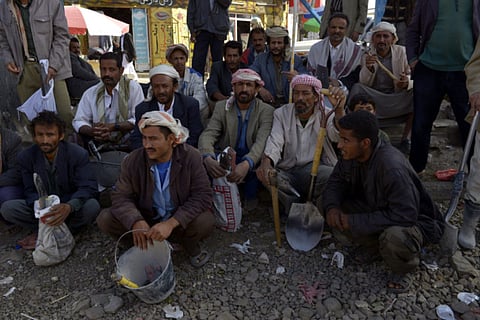Yemenis protest Saudi deportations
Some 80 per cent of Yemenis bought visas from dignitaries who receive permits from authorities to distribute

Sana’a: Ezzeldin Abdullah says he sold many of his valuables to raise 16,000 Saudi riyals (Dh15,793) for a Saudi Arabian visa, hoping work in the biggest oil-producing country in the world would repay his investment many times.
But less than three weeks after arriving, he was arrested in a crackdown on workers lacking proper papers and deported back to Yemen.
“All is lost now,” said the father of three, sitting outside the ministry of expatriate affairs in the Yemeni capital Sana’a.
“All I want is enough time to earn back the price of my visa,” added Abdullah, who was seeking menial or labouring work.
Saudi Arabia, home to about nine million foreign workers, began the crackdown this year to boost the proportion of Saudi citizens in private sector jobs from the current 10 per cent.
Under Saudi law, employers must sponsor expatriates, but many switch jobs without transferring their residency papers.
Of about 200,000 workers deported, some 20,000 were Yemenis, say officials in Saudi Arabia’s impoverished Arab neighbour, adding to joblessness in a nation of 25 million trying to recover from two years of political turmoil. Ahmad Abdullah Al Baydani, a truck driver in his 50s employed by a transport company based in the Muslim holy city of Makkah, said police picked him up during a visit to the Red Sea port of Yanbu in February.
“The police would not accept the written permit I had [to visit Yanbu] or my sponsor’s interventions, and treated me as a runaway worker,” the father of 12 said outside the Expatriates Affairs ministry.
“I was held for two weeks before I was moved to Jeddah, where I was held with hundreds of people for six more weeks before I was deported,” he said.
Saudi King Abdullah earlier in April gave foreigners three months to sort out papers. But few of the estimated one million Yemenis there would be able to do this in time, officials said.
Some 80 per cent of Yemenis in Saudi Arabia bought visas from dignitaries widely believed to receive permits from Saudi authorities to distribute to acquaintances and relatives but which are not proper work permits, according to Abdul Qader Hamam, assistant to the deputy minister of expatriate affairs.
“Yemenis resorted to these methods to get visas because the procedures to obtain a proper visa amount to enslavement,” said Hamam. They often paid up to 16,000 riyals, he said.
Deportees may be willing recruits for militants in Yemen, which faces Islamist insurgents, secessionists in the south and a rebellion by the Houthi community in the north, Hamam said
“Unemployment affects security and when security suffers in one part of the Arabian Peninsula, other parts are affected.”
Last week, scores of Yemenis demonstrated outside the walls of the Saudi embassy in Sanaa. Yemenis say much of Saudi Arabia’s infrastructure since the discovery of oil in the 1930’s was built by their countrymen before the kingdom started relying on Asian workers.
“Saudi Arabia was built by Yemenis and they should not forget this,” a protester who identified herself as Arwa said.



